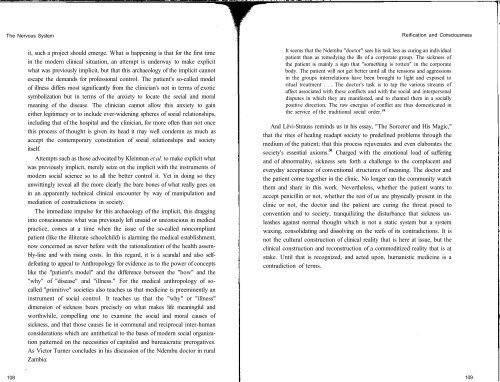The Nervous System - Department of English and Comparative ...
The Nervous System - Department of English and Comparative ...
The Nervous System - Department of English and Comparative ...
You also want an ePaper? Increase the reach of your titles
YUMPU automatically turns print PDFs into web optimized ePapers that Google loves.
<strong>The</strong> <strong>Nervous</strong> <strong>System</strong><br />
it, such a project should emerge. What is happening is that for the first time<br />
in the modern clinical situation, an attempt is underway to make explicit<br />
what was previously implicit, but that this archaeology <strong>of</strong> the implicit cannot<br />
escape the dem<strong>and</strong>s for pr<strong>of</strong>essional control. <strong>The</strong> patient's so-called model<br />
<strong>of</strong> illness differs most significantly from the clinician's not in terms <strong>of</strong> exotic<br />
symbolization but in terms <strong>of</strong> the anxiety to locate the social <strong>and</strong> moral<br />
meaning <strong>of</strong> the disease. <strong>The</strong> clinician cannot allow this anxiety to gain<br />
either legitimacy or to include ever-widening spheres <strong>of</strong> social relationships,<br />
including that <strong>of</strong> the hospital <strong>and</strong> the clinician, for more <strong>of</strong>ten than not once<br />
this process <strong>of</strong> thought is given its head it may well condemn as much as<br />
accept the contemporary constitution <strong>of</strong> social relationships <strong>and</strong> society<br />
itself.<br />
Attempts such as those advocated by Kleinman et al. to make explicit what<br />
was previously implicit, merely seize on the implicit with the instruments <strong>of</strong><br />
modem social science so to all the better control it. Yet in doing so they<br />
unwittingly reveal all the more clearly the bare bones <strong>of</strong> what really goes on<br />
in an apparently technical clinical encounter by way <strong>of</strong> manipulation <strong>and</strong><br />
mediation <strong>of</strong> contradictions in society.<br />
<strong>The</strong> immediate impulse for this archaeology <strong>of</strong> the implicit, this dragging<br />
into consciousness what was previously left unsaid or unconscious in medical<br />
practice, comes at a time when the issue <strong>of</strong> the so-called noncompliant<br />
patient (like the illiterate schoolchild) is alarming the medical establishment,<br />
now concerned as never before with the rationalization <strong>of</strong> the health assembly-line<br />
<strong>and</strong> with rising costs. In this regard, it is a sc<strong>and</strong>al <strong>and</strong> also selfdefeating<br />
to appeal to Anthropology for evidence as to the power <strong>of</strong> concepts<br />
like the "patient's model" <strong>and</strong> the difference between the "how" <strong>and</strong> the<br />
"why" <strong>of</strong> "disease" <strong>and</strong> "illness." For the medical anthropology <strong>of</strong> socalled<br />
"primitive" societies also teaches us that medicine is preeminently an<br />
instrument <strong>of</strong> social control. It teaches us that the "why" or "illness"<br />
dimension <strong>of</strong> sickness bears precisely on what makes life meaningful <strong>and</strong><br />
worthwhile, compelling one to examine the social <strong>and</strong> moral causes <strong>of</strong><br />
sickness, <strong>and</strong> that those causes lie in communal <strong>and</strong> reciprocal inter-human<br />
considerations which are antithetical to the bases <strong>of</strong> modern social organization<br />
patterned on the necessities <strong>of</strong> capitalist <strong>and</strong> bureaucratic prerogatives.<br />
As Victor Turner concludes in his discussion <strong>of</strong> the Ndembu doctor in rural<br />
Zambia:<br />
Reification <strong>and</strong> Consciousness<br />
It seems that the Ndembu "doctor" sees his task less as curing an individual<br />
patient than as remedying the ills <strong>of</strong> a corporate group. <strong>The</strong> sickness <strong>of</strong><br />
the patient is mainly a sign that "something is rotten" in the corporate<br />
body. <strong>The</strong> patient will not get better until all the tensions <strong>and</strong> aggressions<br />
in the groups interrelations have been brought to light <strong>and</strong> exposed to<br />
ritual treatment . . . <strong>The</strong> doctor's task is to tap the various streams <strong>of</strong><br />
affect associated with these conflicts <strong>and</strong> with the social <strong>and</strong> interpersonal<br />
disputes in which they are manifested, <strong>and</strong> to channel them in a socially<br />
positive direction. <strong>The</strong> raw energies <strong>of</strong> conflict are thus domesticated in<br />
the service <strong>of</strong> the traditional social order.<br />
And Levi-Strauss reminds us in his essay, "<strong>The</strong> Sorcerer <strong>and</strong> His Magic,"<br />
that the rites <strong>of</strong> healing readapt society to predefined problems through the<br />
medium <strong>of</strong> the patient; that this process rejuvenates <strong>and</strong> even elaborates the<br />
society's essential axioms. Charged with the emotional load <strong>of</strong> suffering<br />
<strong>and</strong> <strong>of</strong> abnormality, sickness sets forth a challenge to the complacent <strong>and</strong><br />
everyday acceptance <strong>of</strong> conventional structures <strong>of</strong> meaning. <strong>The</strong> doctor <strong>and</strong><br />
the patient come together in the clinic. No longer can the community watch<br />
them <strong>and</strong> share in this work. Nevertheless, whether the patient wants to<br />
accept penicillin or not, whether the rest <strong>of</strong> us are physically present in the<br />
clinic or not, the doctor <strong>and</strong> the patient are curing the threat posed to<br />
convention <strong>and</strong> to society, tranquilizing the disturbance that sickness unleashes<br />
against normal thought which is not a static system but a system<br />
waxing, consolidating <strong>and</strong> dissolving on the reefs <strong>of</strong> its contradictions. It is<br />
not the cultural construction <strong>of</strong> clinical reality that is here at issue, but the<br />
clinical construction <strong>and</strong> reconstruction <strong>of</strong> a commoditized reality that is at<br />
stake. Until that is recognized, <strong>and</strong> acted upon, humanistic medicine is a<br />
contradiction <strong>of</strong> terms.<br />
108 109
















